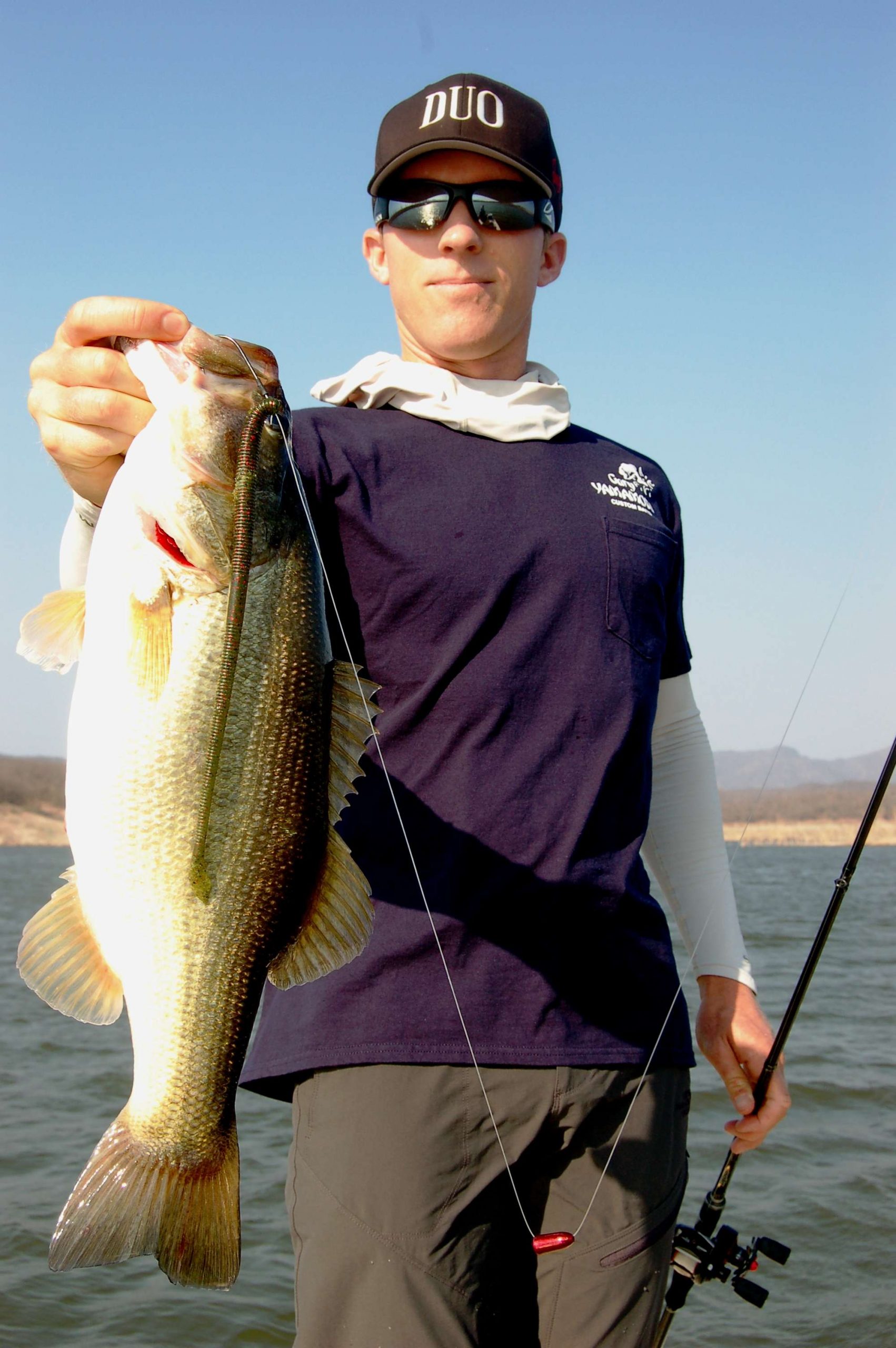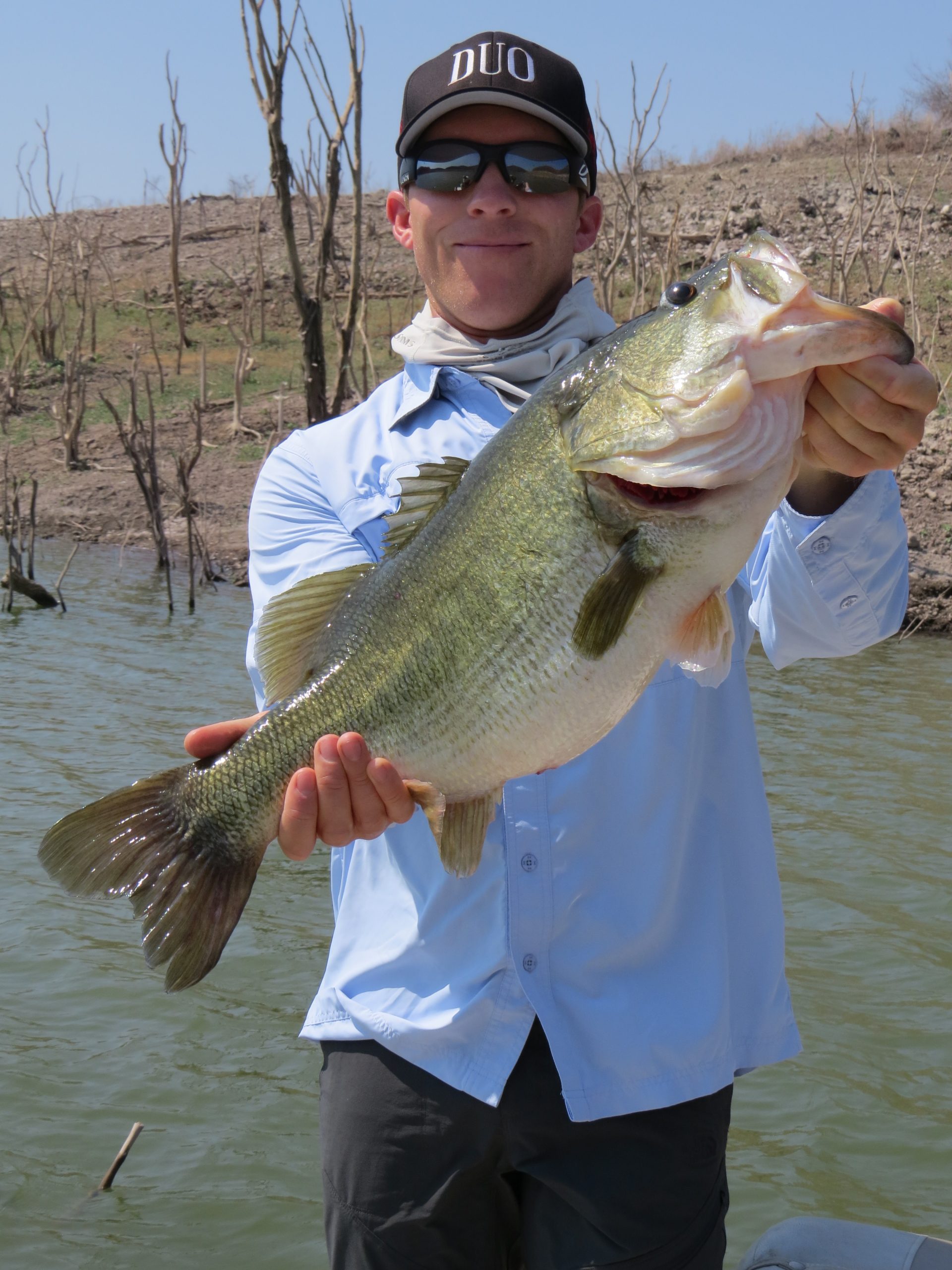
What does an Elite Series rookie do during the break between tournaments?
In the case of Kevin Hawk, he fishes, and then he fishes some more. His vacation from work – and if you don’t believe being a bass pro is work, then I highly recommend you leave the recliner and try it yourself – was more work. He pulled money out of his own pocket and went to the Anglers Inn resort on Mexico’s Lake El Salto. Not quite a hardship tour, but I’m sure that others among the field chose to spend their days off catching up on sleep, family obligations and other aspects of life.
I had spearheaded this trip for a group of five, among whom Hawk was the only pro bass angler. The rest of us were once-a-week or twice-a-month fishermen, or in the case of my wife, fisherwomen. Having been around many other pros, but not Kevin, I worried about whether he would be able to ratchet down the intensity level, put away the all-competition-all-the-time blinders, and actually enjoy his time at El Salto. Some of them can, some can’t. In fact, some of them don’t seem to truly enjoy fishing, except when competing or as a way to make a living.
I shouldn’t have worried. The 34-year-old fished every minute he could, but he shared the front of the boat with us civilians. He never played the “pro card,” never had an “I’m Keith Hernandez” moment, never tried to tell the guides how to do their jobs. I’m sure there were people at Anglers Inn who recognized him, but except when I asked him to don his tournament jersey for some pictures he never indicated to any other guests what he did for a living.
If you’ve never been to Anglers Inn, and you like to fish, I highly recommend that you start saving your pennies. Sell your blood, your coin collection or your first born. Move into a smaller house. Marry for money instead of love. Do anything you can to get there, because in addition to catching the meanest big bass on the planet, you will be treated like a king.
Your guide will unhook every fish if you so desire. He’ll tie your knots if you’re feeling particularly lazy. You need only think about what sort of drink you covet, and it magically appears in your hand, mixed to perfection at the ideal temperature. By the time you get back for a mid-day siesta, your dirty clothes have been laundered and folded. I’d been there before, but Kevin had not, and I wondered how an Elite Series pro, used to doing everything himself, would handle the attention. For the record, he tied his own knots and unhooked (many of) his own fish, but he was humble the entire time. There was no “we need to be fishing somewhere or something else.” There was no bitching about the lack of electronics. Instead, there was the attitude of someone who was not only happy to visit, but grateful that life has given him the opportunity to do so.
Now, you could probably say that this outward lack of intensity is what has Hawk in 7th place in the Bassmaster Rookie of the Year race (Editor’s Note: Hawk finished the 2013 Bassmaster Elite Series race in 5th place), but if you talk to him over dinner, or on the front deck of a boat while flipping a jig to deep hardwood trees or while cranking a rocky point, he’d quietly but forcefully make clear that it’s eating him up. He’s trying to find a way to right his ship amongst the best of the best, and it’s not coming easily to him. He’s had trouble putting together back-to-back good tournament days through five events. I suppose if you didn’t know him you could chalk that up to rookie jitters or relative inexperience, but any fan of the sport knows that he’s no typical rookie. Like others before him, he came to the Elite Series after several years on the FLW Tour, first as a co-angler, then fishing from the front of the boat. Unlike those others, though, Hawk won the 2010 Forrest Wood Cup and the $600,000 first place prize.
 Again, you’d never know it unless you asked him. As we peppered him with questions about his magical week at Lake Lanier, he politely demurred and turned the conversation back to the El Salto experience or asked us questions about our lives.
Again, you’d never know it unless you asked him. As we peppered him with questions about his magical week at Lake Lanier, he politely demurred and turned the conversation back to the El Salto experience or asked us questions about our lives.
Gradually, in dribs and drabs, he let it slip that the El Salto trip was certainly a vacation, but also a springboard into righting his season with three Elite Series tournaments and a handful of Opens left to go. I wouldn’t say that he won the Cup too early in his career – after all, you take a win like that whenever you can get it – but unlike the Brauers and VanDams who won their first title after years of maturation, Hawk is still in the early stages of his quest. The expectations are high, both from within and from the fans, and he’s trying to live up to them.
One thing Kevin doesn’t need to prop up, though, is his demeanor. His track record – not just the FLW championship, but also his qualifying for the Elites on his first try – speaks for itself. I knew going into the trip that he could fish well, and that was confirmed on the water, but all 100 of the Elites can catch ‘em. Not all Elites have the business sense or the people skills to maximize their reach in this industry, though.
Here’s the three prong test you should use to judge any pro’s character:
Would I enjoy fishing with him?
If I owned a company, would I sponsor him?
Would I let him date my daughter?
As for No. 1, yes, you would enjoy fishing with Kevin Hawk. He’s humble, he’s friendly and he’s talkative when it’s appropriate. Each of the three other members of our party, none of whom had met him before, came back to the lodge after fishing with him with the same reaction – “It’s like I’ve known him for years.” They also said “It’s like fishing with my best friend, if my best friend happened to be a better fisherman.” There was no cutthroat jockeying to be the first to cast to the next spot, no explaining what we were doing wrong, no attitude. He also volunteered at times to fish from the back deck. I wish I had gotten a picture of that. Alex, I’ll take “Things Most Pros Would Never Do” for a thousand.
 With respect to the sponsorship question, I quizzed him about his current sponsors, watched to see if he used their equipment and asked about his business plan. In each regard what struck me most was the earnestness – his thankfulness to have the support he has, and his strong desire not to jump ship but to gradually build upon the existing relationships. He’s genuinely happy with the companies that have elected to support him, and wants to find ways to repay their faith in him. On multiple occasions I’ve heard other pros – not all or even most of them, but some – complain that they’re underpaid or state that they don’t use their sponsors’ products. I’d buy something based on Kevin Hawk’s recommendation. In fact, I already have logged on to my favorite online retailer since returning on Saturday to purchase one such item.
With respect to the sponsorship question, I quizzed him about his current sponsors, watched to see if he used their equipment and asked about his business plan. In each regard what struck me most was the earnestness – his thankfulness to have the support he has, and his strong desire not to jump ship but to gradually build upon the existing relationships. He’s genuinely happy with the companies that have elected to support him, and wants to find ways to repay their faith in him. On multiple occasions I’ve heard other pros – not all or even most of them, but some – complain that they’re underpaid or state that they don’t use their sponsors’ products. I’d buy something based on Kevin Hawk’s recommendation. In fact, I already have logged on to my favorite online retailer since returning on Saturday to purchase one such item.
Finally, I don’t have a daughter, so the third prong of the character test doesn’t really apply to me. However I do have a wife – not available for dating, but I don’t entrust her to just anyone. She’s tough and feisty, but also a bit insecure when it comes to her fishing skills. She’s fished with me, as well as a few of my local friends, but never a bass pro. When I passed her fishing with Kevin on the second day on the lake and saw them both on the front deck, casting big deep-diving crankbaits toward a point, it was obvious that he’d passed my slightly altered version of the test. She turned around, held up all 10 fingers to signify the weight of his biggest fish of the day, and smiled wide. When they got back to the lodge for lunch, she too said she felt no pressure. It was like fishing with someone she’d known forever. I can think of a handful of Elite Series pros who might incite that same reaction, but not many.
Watch out for Kevin Hawk. He may not set the world on fire this year, but at some point in the not-too-distant future he’ll circle back around to what helped him win at Lanier, and when he does he’ll handle it with class and style.
Originally published June 2013

